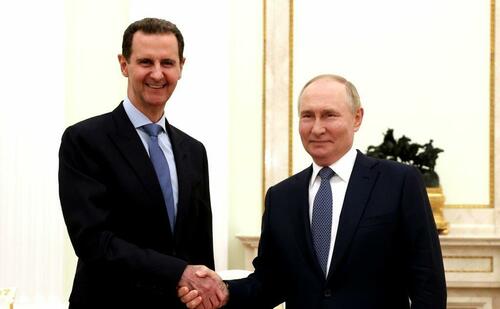
The last two years have seen a handful of regional Middle East countries reestablish official relations with Syrian President Bashar al-Assad, after launching a decade-long proxy war against him. For example, in May 2023 he was welcomed to Saudi Arabia on an official visit for the first time since the war started, and given the red carpet treatment by the Saudi kingdom. And the UAE is among those which have reopened an embassy in Damascus after nearly 13 years of severed ties.
But the West, led by the US and UK, have still waged a maximum pressure campaign against the Syrian state after Assad emerged victorious in the war which sought to topple him. This has included greatly ratcheted sanctions, especially on energy imports, which has decimated the economy and unleashed runaway inflation.
Washington has meanwhile under multiple administrations tried to lobby foreign allies to stay the course in isolating Damascus and keeping up the sanctions, despite an occasional Iranian oil tanker offloading to Syria's Mediterranean ports.

But the tide appears to be turning as a number of European countries, many in the EU and NATO, are increasingly acknowledging that Assad is 'here to stay' and thus they must work with Syria instead of warring against it.
A fresh report in Israel's YNet News says "Foreign ministers from Italy, Cyprus, Slovenia, Slovakia, Austria, the Czech Republic, Greece and Croatia have drafted a position paper calling for a change in the European Union’s approach to Syria, namely lifting sanctions and renewing diplomatic ties with the regime of President Bashar al-Assad."
"Italian Foreign Minister Antonio Tajani and his counterparts argue that the EU’s humanitarian aid policy has failed," the report underscores.
According to some key lines of the document submitted to EU High Representative Josep Borrell:
"After 13 years of war and EU aid, 90% of Syria's population lives below the poverty line, and seven out of ten residents need humanitarian assistance."
"Humanitarian aid alone is not enough. The EU must lift some sanctions against President Assad's regime and engage in diplomatic relations with him. Over the past two years, this issue has been overshadowed by the wars in Ukraine and Gaza, but we must return to it."
Longtime critics of the West's drive for regime change have pointed out the years-long contradiction in policy: the EU allowed arms and ammo to be shipped into Syria (into the hands of anti-Assad jihadist insurgents), all while hand-wringing about the humanitarian and migrant crisis that resulted.
But increasingly these same powers are admitting that sanctions have only served to starve and compound the suffering for the common populace, and have in no way actually weakened the government's grip on the country.
8 EU countries call for renewed ties with Assad regime to stem Syrian refugee tide
— Joshua Landis (@joshua_landis) July 25, 2024
"EU’s policy has failed."
“We must create a reality where residents have the will and interest to stay in Syria and return to it.”
"The EU must lift some sanctions against President Assad's…
In the oil and gas rich northeast of Syria, a US military occupation has persisted, which former President Trump has admitted was all about 'stealing the oil.' But the Biden administration has consistently said it has no plans to pull troops. Perhaps a future Trump administration might finally get the US out of Syria
The last two years have seen a handful of regional Middle East countries reestablish official relations with Syrian President Bashar al-Assad, after launching a decade-long proxy war against him. For example, in May 2023 he was welcomed to Saudi Arabia on an official visit for the first time since the war started, and given the red carpet treatment by the Saudi kingdom. And the UAE is among those which have reopened an embassy in Damascus after nearly 13 years of severed ties.
But the West, led by the US and UK, have still waged a maximum pressure campaign against the Syrian state after Assad emerged victorious in the war which sought to topple him. This has included greatly ratcheted sanctions, especially on energy imports, which has decimated the economy and unleashed runaway inflation.
Washington has meanwhile under multiple administrations tried to lobby foreign allies to stay the course in isolating Damascus and keeping up the sanctions, despite an occasional Iranian oil tanker offloading to Syria’s Mediterranean ports.

But the tide appears to be turning as a number of European countries, many in the EU and NATO, are increasingly acknowledging that Assad is ‘here to stay’ and thus they must work with Syria instead of warring against it.
A fresh report in Israel’s YNet News says “Foreign ministers from Italy, Cyprus, Slovenia, Slovakia, Austria, the Czech Republic, Greece and Croatia have drafted a position paper calling for a change in the European Union’s approach to Syria, namely lifting sanctions and renewing diplomatic ties with the regime of President Bashar al-Assad.”
“Italian Foreign Minister Antonio Tajani and his counterparts argue that the EU’s humanitarian aid policy has failed,” the report underscores.
According to some key lines of the document submitted to EU High Representative Josep Borrell:
“After 13 years of war and EU aid, 90% of Syria’s population lives below the poverty line, and seven out of ten residents need humanitarian assistance.”
“Humanitarian aid alone is not enough. The EU must lift some sanctions against President Assad’s regime and engage in diplomatic relations with him. Over the past two years, this issue has been overshadowed by the wars in Ukraine and Gaza, but we must return to it.”
Longtime critics of the West’s drive for regime change have pointed out the years-long contradiction in policy: the EU allowed arms and ammo to be shipped into Syria (into the hands of anti-Assad jihadist insurgents), all while hand-wringing about the humanitarian and migrant crisis that resulted.
But increasingly these same powers are admitting that sanctions have only served to starve and compound the suffering for the common populace, and have in no way actually weakened the government’s grip on the country.
8 EU countries call for renewed ties with Assad regime to stem Syrian refugee tide
“EU’s policy has failed.”
“We must create a reality where residents have the will and interest to stay in Syria and return to it.”
“The EU must lift some sanctions against President Assad’s…
— Joshua Landis (@joshua_landis) July 25, 2024
In the oil and gas rich northeast of Syria, a US military occupation has persisted, which former President Trump has admitted was all about ‘stealing the oil.’ But the Biden administration has consistently said it has no plans to pull troops. Perhaps a future Trump administration might finally get the US out of Syria?
Loading…





